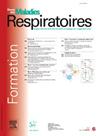Une méthode simple pour dépister la distension dynamique pulmonaire : le test de tachypnée rythmée par un métronome
IF 0.5
4区 医学
Q4 RESPIRATORY SYSTEM
引用次数: 0
Abstract
La distension pulmonaire dynamique est un déterminant de la dyspnée des malades respiratoires chroniques. Sa mise en évidence permet d’en expliquer la cause, d’orienter et évaluer l’efficacité des traitements. Cependant, la mesure de la capacité inspiratoire (CI) lors d’une épreuve d’effort maximale (EFx), est limitée par le difficile accès des patients à cet examen. Une méthode alternative, plus simple et accessible, est la mesure de la CI au cours d’un test de tachypnée rythmée par un métronome (TRM). Malgré certaines études ayant fait état d’une faible spécificité, cette méthode est apparue faisable, mais aussi reproductible, valide en particulier pour la dyspnée des activités de la vie journalière, et sensible aux traitements. La standardisation méthodologique est détaillée dans la présente revue, de même que le décalage observé entre les changements de CI au cours de l’EFx et au cours du TRM. En conclusion, la recherche d’une distension dynamique peut être réalisée pour tout patient en consultation de pneumologie via le test de TRM. Le seuil de 11 % de base de baisse de la CI par rapport à sa valeur de base au cours du test TRM peut être retenu pour le dépistage de la distension dynamique, même s’il faut rester prudent pour l’interprétation en cas de test positif. Le suivi des variations de CI sur le test TRM permet de surveiller l’évolution du patient et la réponse aux traitements.
Lung dynamic hyperinflation (DH) is one of the main determinants of dyspnea in chronic respiratory disease patients. Producing evidence of DH is critical during dyspnea assessment, the objectives being to explain the cause, to target treatments, and to monitor their efficacy. The gold standard method consists in repeated measurement of inspiratory capacity (IC) during cardiopulmonary exercise testing (CPET). Unfortunately, access to CPET is limited and assessment of IC during CPET can be challenging in some patients. An alternative method consists in assessment of IC during the testing known as metronome-paced tachypnea (MPT) challenge. This method is feasible, repeatable, valid (i.e. corelated with dyspnea patients’ activities of daily living), and responsive to treatments. However, while its diagnostic performance is acceptable, it is lacking in specificity. Methodological standardization is detailed in the present review, as are the differences between IC changes in CPET and in MPT. As a means of assessing DH, MPT challenge is not only applicable to patients outside a pulmonary function test laboratory, but also easily affordable to any chest physician equipped with a simple spirometry device. A diagnosis threshold of 11% for IC decrease during MPT challenge can be used, albeit while bearing in mind the possibility of a false positive result. Moreover, assessment of IC variations during MPT can help to monitor a patient's overall evolution and response to treatments.
[在肺功能试验室外评估动态恶性充气的一种简单方法:节拍器节律性呼吸急促试验]。
肺动态过度充气(DH)是慢性呼吸系统疾病患者呼吸困难的主要决定因素之一。在呼吸困难评估中,产生DH的证据是至关重要的,其目的是解释原因,有针对性的治疗,并监测其疗效。金标准方法包括在心肺运动试验(CPET)中反复测量吸气量(IC)。不幸的是,接受CPET的机会有限,在CPET期间对IC的评估对一些患者来说是具有挑战性的。另一种方法包括在测试期间评估IC,称为节拍器节奏性呼吸急促(MPT)挑战。该方法可行、可重复、有效(即与呼吸困难患者的日常生活活动相关),对治疗反应灵敏。然而,虽然它的诊断性能是可以接受的,但它缺乏特异性。本综述详细介绍了方法标准化,以及CPET和MPT中IC变化的差异。作为一种评估DH的手段,MPT挑战不仅适用于肺功能测试实验室之外的患者,而且对于任何配备简单肺活量测量设备的胸科医生来说都很容易负担得起。尽管考虑到假阳性结果的可能性,但可以使用MPT挑战期间IC减少11%的诊断阈值。此外,评估MPT期间的IC变化有助于监测患者的整体演变和对治疗的反应。
本文章由计算机程序翻译,如有差异,请以英文原文为准。
求助全文
约1分钟内获得全文
求助全文
来源期刊

Revue des maladies respiratoires
医学-呼吸系统
CiteScore
1.10
自引率
16.70%
发文量
168
审稿时长
4-8 weeks
期刊介绍:
La Revue des Maladies Respiratoires est l''organe officiel d''expression scientifique de la Société de Pneumologie de Langue Française (SPLF). Il s''agit d''un média professionnel francophone, à vocation internationale et accessible ici.
La Revue des Maladies Respiratoires est un outil de formation professionnelle post-universitaire pour l''ensemble de la communauté pneumologique francophone. Elle publie sur son site différentes variétés d''articles scientifiques concernant la Pneumologie :
- Editoriaux,
- Articles originaux,
- Revues générales,
- Articles de synthèses,
- Recommandations d''experts et textes de consensus,
- Séries thématiques,
- Cas cliniques,
- Articles « images et diagnostics »,
- Fiches techniques,
- Lettres à la rédaction.
 求助内容:
求助内容: 应助结果提醒方式:
应助结果提醒方式:


